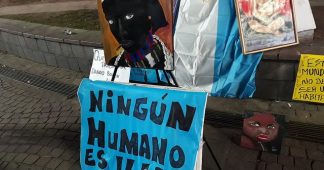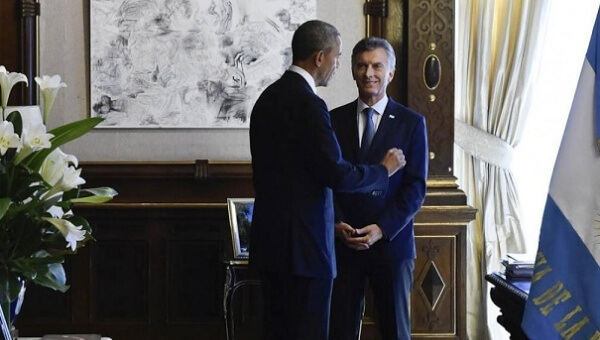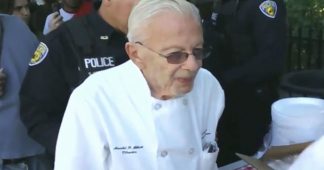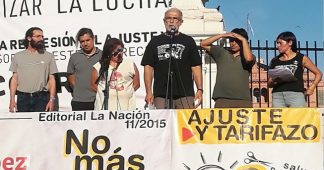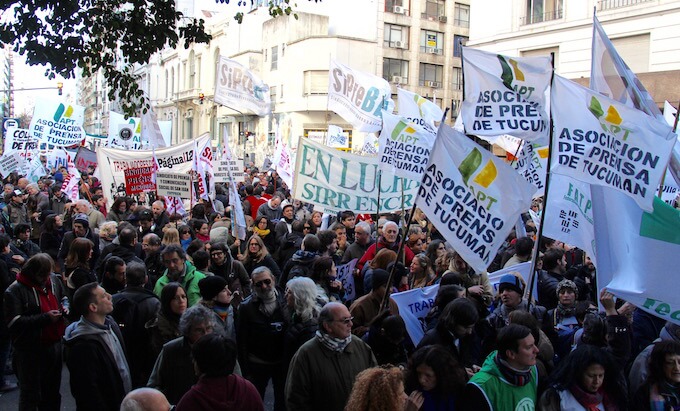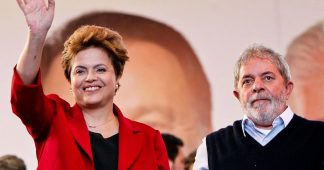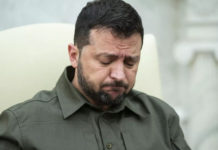By Rafael Azul
1 December 2018
As the presidents of the Group of 20 nations (G20), representing the world’s top economies, were preparing to travel to their 13th economic summit in Buenos Aires, this weekend, Argentine authorities were in the process of rounding up and forcibly expelling homeless families who reside in downtown Buenos Aires.
The violent expulsion of the homeless has been accompanied by naked repression and the suppression of democratic rights. Buenos Aires and federal officials are using the G20 meeting as a dress rehearsal for police-state measures appropriate to a military dictatorship.
Página 12, a Buenos Aires daily, quoted Martín, a 19-year-old homeless resident who told a reporter from the Telam press agency, “They are closing the neighborhood because of the G20.” Martín, his 18-year-old companion and their baby were expelled together with all the homeless who sleep in the parks and doorways of the city center. “We moved here six months ago because we could not afford to pay rent anyplace,” declared the youth, who works gathering and recycling paper and cardboard discarded by downtown offices. “I earn enough to eat, but not enough to pay for even a tiny room,” he added. Non-governmental organizations estimate that 7,300 homeless now live in the city of Buenos Aires, a 30 percent increase over 2017.
The removal of the homeless is part of an operation by Federal police and security forces who erected a perimeter around government buildings in Buenos Aires city center in anticipation of mass protests.
More than one thousand homeless live in the targeted zone. “Government workers came by and told us that because of the visit of the presidents, we would have to leave,” said Sergio, a single dad who with his four children occupies two mattresses in Plaza de Mayo square, across from Argentina’s Government House.
Among the leaders arriving for the summit was Saudi Prince Mohammed bin Salman, who was given a warm welcome Thursday morning by Argentina’s foreign minister Marcelo Fauri; the prince, with an entourage of over 1,000 men, was among the first to arrive.
There is a pending demand by Human Rights Watch in the Argentine courts for the arrest of the Saudi prince for war crimes in Yemen involving “indiscriminate air raids aimed against civilians” and for the assassination of Saudi journalist Jamal Khashoggi; none expect that this protégé of Trump and imperialism will be detained during his two days in Buenos Aires.
In Argentina there is increasing mass opposition to the austerity policies imposed by the administration of President Mauricio Macri in collaboration with the International Monetary Fund. The measures demanded by the IMF to rescue the Argentine economy require dictatorial policies.
The G20 summit is taking place under the most repressive conditions in Argentine history. Throughout the week, thousands of police placed barriers and established three concentric security zones. Twenty thousand gendarmes are in place in addition to the five thousand police assigned as personal guards to the summit delegates.
City authorities declared that this Friday, the opening day of the summit, would be a no-work holiday and advised residents to leave the city. Subway lines and metropolitan rail service have been suspended. All domestic flights into Buenos Aires have been cancelled. Auto traffic was re-routed around the security perimeter.
A 460-kilometer circumference air traffic exclusion zone was imposed over Buenos Aires, presumably including the La Plata River and part of Uruguay, further restricting flights. Buenos Aires is truly a city under siege. President Macri has threatened to shoot down airplanes flying overhead.
While the immediate target of the massive security apparatus may be a protest march on Congress repudiating the G20 summit and the agreement between Macri and the IMF—organized by Nobel Peace Prize recipient Adolfo Pérez Esquivel and dozens of civil rights organizations—the real target is the repudiation by the working class and large sections of the middle class of the Macri government, its neo-liberal and corrupt policies and its prostration to imperialism.
Throughout this week there have been mass rallies and protest marches by workers and students in the context of a collapsing dollar, ever increasing prices, job cuts and increasing misery. Industrial production in Argentina is now at the same level that it was in 2002, during the last financial and debt crisis.
The series of demonstrations have been met with police repression that in the last week resulted in two deaths and many wounded.
In a police station in Esteban Echeverría, eight people in “preventive detention” were left to die when a fire took place and police officers abandoned the prisoners.
Police used rubber bullets against protesters occupying vacant land in the town of Jose Leon Suarez, wounding several.
On November 22, a member of the Federation of the Workers of the People’s Economy (CTEP), Rodolfo Orellana, was killed by police during an attempted eviction.
In the city of Cordoba, labor activist Marcos Jesús Soria was beaten and killed by government security agents. According to CTEP, Soria, after being beaten, attempted to hide in a horse stable, but was shot in the back by the police who then threatened eye-witnesses to the crime, ordering them not to reveal what had happened.
A CTEP communiqué condemned the “hunting down of activists in the context of increasing repression by the government of Mauricio Macri and his Security Minister, Patricia Bullrich.”
The police repression extends to strikes and occupations. Last week police violently ended an occupation by workers at a factory of consumer durables, Siam, injuring workers and their supporters. In each of these cases the security forces have acted with total impunity.
Officials in charge of security have warned that they will strongly repress any incidents considered violent, that police will not stand idly by and will react against any act that it considers provocative. The latest turn of the screw authorizes police forces to use live ammunition against demonstrators.
This police-state response in the context of the G20 summit and the far broader social struggles gripping Argentina represents an abrogation of the democratic right to assemble and protest and the adoption of dictatorial forms of rule.
